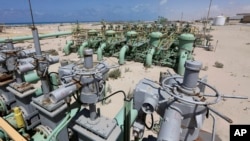Libya’s foreign minister has painted a bleak picture of the situation in his country, warning it could become a failed state without international assistance.
Mohamed Abdul-Aziz appealed to the U.N. Security Council Thursday, saying Tripoli needs help to protect its oil fields and build functioning government institutions. The minister was adamant, however, that this would not involve military intervention.
“What we are calling for is a stabilization and institution-building mission. Mainly experts who can train Libyans on the site in relation to building the military, building the police, building the intelligence establishment," he said. "At the same time, helping us with a security strategy that will protect our oil fields, because 98 percent of the income of Libya comes from the oil."
He asked that this assistance be under United Nations auspices, but said if the U.N. could not provide it, Libya would seek it through regional or bilateral arrangements.
The U.N. already has a small political support mission in Libya. UNSMIL was established in 2011, at the request of the transitional government to assist on several fronts, including political affairs, human rights, transitional justice and demobilization. It has just over 200 personnel in Libya, but on Monday had to temporarily relocate most of them outside the country due to the recent escalation in fighting that has seen both the Tripoli and Benghazi airports close.
Foreign Minister Abdul-Aziz also noted that over the past year, oil production has dropped from 1.5 million barrels per day to between 150 and 300 barrels daily, costing the government some $30 billion in lost revenue. He said the government does not have the tools necessary to handle militants who have taken control of the country’s main resource.
He warned that there are many indications that Libya is headed toward becoming a failed state and that the Security Council should engage more effectively to prevent that happening.
“Should Libya become a failed state, kidnapped by radical groups and warlords, the consequences will be far reaching and perhaps could be beyond control," he said.
He cautioned that Libya could become a “hub” for religious radicals and extremists, especially in the lawless east of the country.
In the past week, the country has seen some of its fiercest fighting since the toppling of dictator Moammar Gadhafi in 2011.










